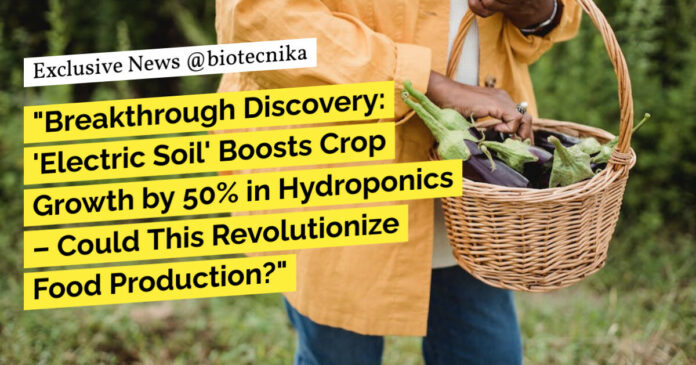
Electric Soil Boosts Crop Growth by 50% – Breakthrough Discovery
In a world with a growing population and the challenges of climate change, traditional agriculture methods may not be sufficient to meet the increasing demand for food. However, researchers from Linköping University have developed a groundbreaking solution that could revolutionize food production. They have created an electrically conductive substrate, known as electronic soil or eSoil, specifically designed for hydroponic cultivation. This technology has shown promising results, with barley seedlings growing up to 50% more when their roots were stimulated electrically. In this article, we will explore the potential of electronic soil to enhance crop growth in hydroponics and its implications for the future of agriculture.
The Benefits of Hydroponic Cultivation:
Hydroponics is a soilless cultivation method that utilizes water, nutrients, and a substrate to grow plants. Unlike traditional farming, hydroponics enables highly controlled and resource-efficient cultivation in urban environments. By using this closed system, water can be recirculated, resulting in minimal water usage and optimal nutrient distribution. Additionally, vertical cultivation in large towers maximizes space efficiency. Lettuce, herbs, and some vegetables are already being successfully grown using hydroponics. However, grains like barley were not previously cultivated in this manner. The
introduction of electronic soil has changed this paradigm.
Understanding Electronic Soil:
Electronic soil, or eSoil, is a conductive cultivation substrate developed by researchers at Linköping University. Unlike traditional hydroponic substrates made from non-biodegradable mineral wool, eSoil is made from cellulose, the most abundant biopolymer, mixed with a conductive polymer called PEDOT. This novel combination has been used for the first time to create an interface for plants in hydroponics. Previous research used high voltage to stimulate root growth, but the benefits of eSoil are its low energy consumption and absence of high voltage danger.
Enhancing Crop Growth with Electronic Soil:
The Linköping University researchers conducted a study using barley seedlings to evaluate the effects of electronic soil on plant growth. They found that when the seedlings’ roots were stimulated electrically using eSoil, they exhibited a 50% increase in growth rate compared to traditional hydroponic cultivation. The exact biological mechanisms behind this phenomenon are still being studied. However, it is known that seedlings grown in electronic soil process nitrogen more effectively, leading to faster growth. This discovery has the potential to significantly improve crop yields, especially in areas with limited arable land and challenging environmental conditions.
The Implications for Future Agriculture:
While it is important to note that hydroponics alone cannot solve the global food security issue, it has the potential to play a crucial role in achieving sustainable and efficient food production. By using electronic soil, crop growth can be accelerated with fewer resources, making hydroponics a viable solution for urban farming and regions with unfavorable agricultural conditions. The development of eSoil opens up new avenues for research and innovation in hydroponic cultivation.
The development of electronic soil by researchers at Linköping University marks a significant advancement in hydroponic cultivation. By stimulating plant growth through electrical stimulation, eSoil has shown the potential to enhance crop yields and contribute to sustainable agriculture. With further research and development, electronic soil could be a game-changer in food production, particularly in areas with limited arable land and harsh environmental conditions. As the global population continues to rise and climate change poses new challenges, innovative approaches like eSoil offer hope for a more resilient and food-secure future.
Keywords: Electric Soil Boosts Crop Growth by 50% – Breakthrough Discovery, electronic soil, hydroponic cultivation, crop growth, sustainable agriculture, food production, urban farming, nutrient distribution, eSoil, electrical stimulation, vertical cultivation, efficient farming, plant growth stimulation
- SEO Powered Content & PR Distribution. Get Amplified Today.
- PlatoData.Network Vertical Generative Ai. Empower Yourself. Access Here.
- PlatoAiStream. Web3 Intelligence. Knowledge Amplified. Access Here.
- PlatoESG. Carbon, CleanTech, Energy, Environment, Solar, Waste Management. Access Here.
- PlatoHealth. Biotech and Clinical Trials Intelligence. Access Here.
- Source: https://www.biotecnika.org/2024/01/breakthrough-discovery-electric-soil-boosts-crop-growth-by-50-in-hydroponics-could-this-revolutionize-food-production/

